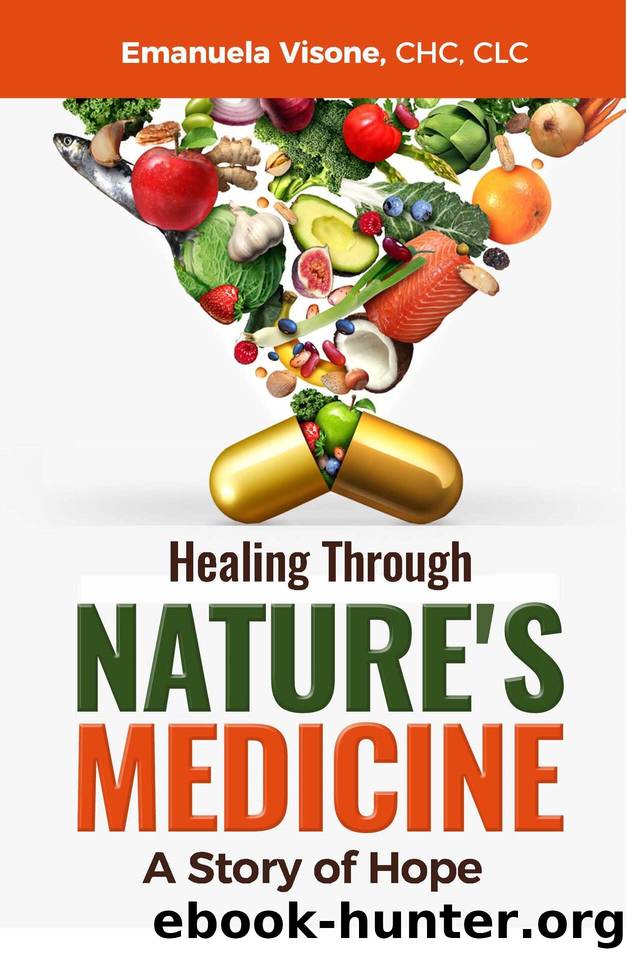Healing Through Nature's Medicine: A Story of Hope by Visone Emanuela

Author:Visone, Emanuela [Visone, Emanuela]
Language: eng
Format: epub
Published: 2020-07-31T16:00:00+00:00
Nutritional stimulants: Partial & processed foods (i.e., white sugar, refined flour, and processed oils). Foods in excess (overeating). Wrong food combinations (meat and potato). Toxic foods (i.e., dairy products, meats, margarine, etc.) Non-foods (i.e., salt, alcohol, regular and decaffeinated coffee and tea, diet drinks, drugs and medications, artificial sweeteners, preservatives, foods colorings, additives, vitamins, and mineral supplements made synthetically or chemically)
The energy and nutrients utilized by the body during stimulation do not come from the toxin being eliminated. Instead, the body must supply from its reserves and tissues the energy and the nutrients needed for processing. This results in a depletion of “good health components” or, eventually, disease.
When the body is “revved up” (experiencing stimulation – i.e., drinking coffee), there results in a false feeling of well-being – we feel full of energy. This is due to the artificially induced, increased metabolism. The delusion is that because we feel good (stimulated), we do not realize we are doing any harm to the body by consuming or being exposed to stimulants.
Disease symptoms (pain, inflammation, depression, fever, hyperactivity, etc.) are the body’s efforts at eliminating or dealing with toxins and stimulants.
THE EFFECTS OF STRESS ON THE BODY
Increased cortisol production: Associated with weight gain (especially in the belly), inability to lose weight or gain muscle, and premature aging.
Decreased nutrient absorption: Due to decreased enzymatic production from the stomach, pancreas, and liver, decreased bile flow from the gallbladder, as well as reduced oxygenation and gastrointestinal blood flow.
Increased nutrient excretion: Stress increases the urinary excretion of calcium; magnesium; potassium; zinc; chromium; selenium; and various trace.
Decreased gut flora populations: Stress destroys healthy intestinal bacteria, which can lead to immune problems, skin disorders, nutrient deficiencies, and digestive distress.
Increase in salt retention: Can lead to high blood pressure (hypertension).
Decrease in thermic efficiency: Ability to burn calories is diminished.
A decrease in thyroid hormone: Can decrease the body's metabolic activity.
Increase in blood cholesterol: Stress raises LDL cholesterol levels.
Increase in blood platelet aggregation: A significant risk factor in heart disease.
Decrease in sex hormones: Can lower sex drive, energy, and decrease muscle mass.
Increase in inflammation: The basis of many ailments, including brain and heart disease.
Increase in gastric emptying time: Can lead to constipation and can be a risk factor in diseases of the colon.
Download
This site does not store any files on its server. We only index and link to content provided by other sites. Please contact the content providers to delete copyright contents if any and email us, we'll remove relevant links or contents immediately.
Inner Engineering: A Yogi's Guide to Joy by Sadhguru(6785)
The Power of Now: A Guide to Spiritual Enlightenment by Eckhart Tolle(5743)
Fear by Osho(4726)
Ikigai by Héctor García & Francesc Miralles(4235)
The Art of Happiness by The Dalai Lama(4120)
The Ultimate Bodybuilding Cookbook by Kendall Lou Schmidt(3926)
Yoga Therapy by Mark Stephens(3741)
The Little Book of Hygge by Meik Wiking(3676)
The Healing Self by Deepak Chopra(3568)
Why Buddhism is True by Robert Wright(3442)
The Hatha Yoga Pradipika (Translated) by Svatmarama(3315)
Being Aware of Being Aware by Rupert Spira(3271)
Shift into Freedom by Loch Kelly(3192)
Wild Words from Wild Women by Stephens Autumn(3136)
Work Clean by Dan Charnas(3111)
Happiness by Matthieu Ricard(3037)
More Language of Letting Go: 366 New Daily Meditations by Melody Beattie(3017)
Yoga Body & Mind Handbook by Jasmine Tarkeshi(2867)
Why I Am Not a Feminist by Jessa Crispin(2737)
